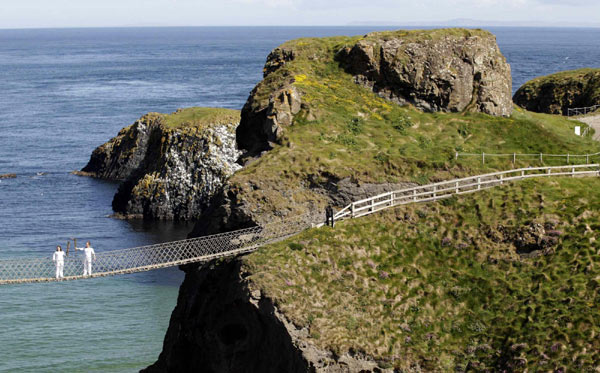Olympic torch spotlights Northern Ireland coast
 0 Comment(s)
0 Comment(s) Print
Print E-mail China Daily, June 6, 2012
E-mail China Daily, June 6, 2012
Olympic torchbearers carried the symbolic flame of the London Games to some of Northern Ireland's most beautiful coastal attractions Monday, and then headed to two communities associated with moments of terror.
This week's tour of Northern Ireland is putting an international spotlight on dramatically improved times in the British territory, where a cease-fire observed by most Irish Republican Army members since 1997 has allowed a lasting peace process to blossom.
But police say several small IRA factions still lurking in the background would like to disrupt the celebrations and they have deployed extra officers to suppress the threat.
In the city of Londonderry, the final destination for Monday's Olympic procession, police closed a road after spotting a potential IRA bomb at a junction near a Catholic high school. But British Army bomb disposal engineers declared it a hoax. The bomb alert took place away from the torch's planned route in a district.
And the start to Monday's torch relay provided a dream for the Northern Ireland Tourist Board, with three of the most memorable sights along the northern coast basking in rare sunshine.
Two torchbearers met in the middle of the Carrick-a-Rede rope bridge, a vertigo-inducing attraction that connects mainland cliffs to a tiny island, with one using her flame to light the other's torch.
Next, another torchbearer walked carefully along the Giant's Causeway, an up-and-down natural stairway composed of tens of thousands of six-sided basalt rocks that run right into the Atlantic. The carrier, 54-year-old Ironman athlete Peter Jack, said he had to concentrate not to slip or stumble on the wet, flat-topped columns of basalt. About 1,000 spectators and visitors cheered as he reached the highest rock nearest the waterline and raised the flame.
It next visited the ruins of Dunluce Castle, a cliffside residence that was abandoned after its kitchen and staff fell one night into the Atlantic. Then the day's torch relay properly began near the university town of Coleraine. The flame was loaded onto an eight-man rowing boat and ferried across the Bann, the major river of Northern Ireland that cuts the province into a predominantly British Protestant east and mostly Irish Catholic west.
The route west kept torchbearers hugging the broad-beached coast. Up ahead lay the villages of Ballykelly and Greysteel.
Londonderry planned a sold-out, 12,000-ticket street party for the torch's arrival Monday night. The torch route includes a journey across the new pedestrian Peace Bridge connecting the city's mostly Protestant east and Catholic west.
The torch travels Tuesday through more than a dozen Northern Ireland towns and villages, including Omagh. On Wednesday, it crosses the border for a circuit of Dublin, the capital of the Republic of Ireland, before returning north for a tour of Belfast and party outside Belfast City Hall.
Go to Forum >>0 Comment(s)
 Add your comments...
Add your comments...
- User Name Required
- Your Comment
- Racist, abusive and off-topic comments may be removed by the moderator.






